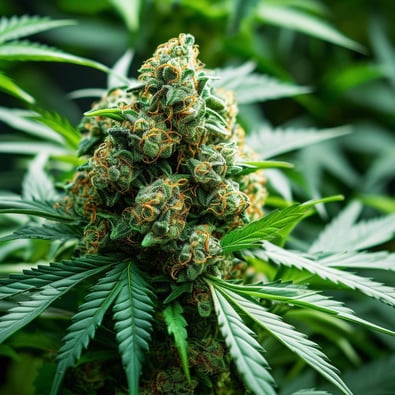Debate surrounding the legality of medical cannabis in Malaysia re-emerged recently following the arrest last month of nasyid singer Muhammad Yasin Sulaiman, who has bipolar disorder.
On March 31, the 47-year old Yasin, who is also a composer, was charged with drug trafficking after officers found 17 cannabis plants and 214 grams of dried plant material at his home in Kota Damansara, near here.
Bipolar disorder, also known as manic depression, is a mental illness that brings severe high and low moods and changes in sleep, energy, thinking, and behaviour. It affects work, school, relationships, physical health and many other aspects of everyday life.
To date, scientists have neither identified the actual cause of bipolar disorder nor found a cure. However, it can be treated using a combination of different treatments such as medicine to prevent episodes of mania and depression and these are known as mood stabilisers.
Others include psychological treatment such as talking therapies, which help the individual deal with depression; and also lifestyle advice, such as doing regular exercise. But, there are those who resort to alternative treatments such as the use of cannabis or ganja.
Legalizing medical cannabis
But is cannabis actually effective in managing bipolar disorder symptoms? Or could it make it worse? Existing evidence suggests severe side effects of cannabis use, including symptoms of psychosis in some instances.
Yasin's arrest sparked nationwide debate on the medical legality of cannabis, with various quarters urging the government to consider legalising the use of medical cannabis.
Health Minister Khairy Jamaluddin on Nov 17, 2021 said applications for the use of cannabis for medical purposes can be submitted to the Drug Control Authority (DCA) for evaluation and registration if there is sufficient scientific evidence for it to be marketed.
He said, however, at present there were no cannabis-based products used for medical purposes in humans registered in Malaysia.
Meanwhile, on April 12 this year, the Medical Cannabis Caucus led by Muar Member of Parliament, Syed Saddiq Syed Abdul Rahman held a meeting with Prime Minister Datuk Seri Ismail Sabri Yaakob to discuss policy issues related to the hemp industry, medical cannabis and ketum for use in Malaysia.
The caucus in a statement informed that during the meeting, the prime minister had given a positive response to the issues raised, and that the matter would be dealt with in further detail in the Cabinet Meeting.
On the use of ganja for medical purposes, Senator Datuk Ras Adiba Radzi said that Malaysia should play a serious role and take progressive actions to allow the use of cannabis and hemp, especially Cannabidiol (CBD).
The Senate member representing persons with disabilities (OKU), said the usage of the substances is to increase access to quality health services for their well-being.
In-depth study needed
Shedding some light on the issue, Dr Firdaus Aziz, a psychiatrist and addiction psychiatrist, said there is no data and in-depth study to confirm that cannabis is safe for treating bipolar disorder.
"There were studies made on the use of certain substance in cannabis for psychosis treatment but no data is available, with no conclusive findings on the effectiveness and safety of the substance. Cannabis can have a detrimental effect on health if abused, particularly at higher potency levels.
"There are two main natural compounds found in the cannabis plant - CBD and Tetrahydrocannabidiol (THC) which are known as cannabinoids. They are the active ingredients that are responsible for the way cannabis affects people.
"THC is the main psychoactive compound in cannabis that produces the high sensation and is linked to psychosis and anxiety while CBD, which is commonly known as the healing compound within cannabis, makes the person feel calm and relaxed," he told Bernama recently.
Elaborating on the issue, Dr Firdaus said most individuals who smoke cannabis to enjoy it recreationally will focus on cannabis with higher THC concentration compared to CBD.
He said cannabis is linked to mental health problems and may cause schizophrenia symptoms if taken over a long period of time and in large amounts.
At the same time, studies have shown that cannabis, also known as marijuana, can have negative effects on people with bipolar disorder including the risk of self-harm and suicide.
"In psychiatry, there are psychotropic medications used to effectively treat bipolar disorder, such as mood stabilisers which are found to help stabilise moods and reduce severe allergic reactions.
"However, it should be stressed that effective treatment for bipolar disorder also involves psychological counselling (psychotherapy) to control symptoms and also may include education and support groups. While its effectiveness is also dependent on the suitability of the medications for the individual, cooperation between the patient and the doctor concerned is also vital.
"Hence bipolar disorder patients are advised to understand the risks and dangers of cannabis to treat the disorder and they should take responsibility for their own choice of treatment," he said.
Own choice
Meanwhile, a psychiatrist and addiction psychiatrist at the Alaminda Specialist Clinic Dr Mohd Fadzli Mohamad Isa opined that individuals with bipolar disorder made their own choice when they used cannabis for "self-medication."
"There is a great possibility that the compounds referred to (in the cannabis) are cannabinoids - CBD and THC. However, specific scientific studies are needed before it (cannabis) is used as medication to treat bipolar disorder as THC has psychoactive effects that can worsen the patient's condition," he noted.
Dr Mohd Fadzli who is also a committee member of the Malaysian Psychiatric Association, said the use of cannabis over a long period of time can cause the individual to develop dependency syndrome or addiction as well as physical complications such as pneumonia which can lead to respiratory tract inflammation and lung cancer.
"Prolonged use of ganja can affect the cognitive system or thinking process of an individual, as well as his or her psychological and mental health, such as extreme anxiety, depression, delusion and hallucination.
"Social effects which are often associated with ganja include under performance of employees at work. Addiction to a substance may lead to neglecting responsibilities and can have devastating effects on relationships," he added.
Occupational therapy
Dr Mohd Fadzli also shared his views on studies which have proven medications and psychotherapy that are supported with other therapies such as continuous occupational therapy, can manage extreme bipolar disorder.
He said occupational therapy helps patients to rebuild their lives and allows them to positively contribute to their family and society.
"All these treatments, which have been proven through scientific research, are already incorporated in the guidelines for medical practitioners to effectively treat bipolar disorder," he said, adding that the use of cannabis and its effectiveness in treating psychiatric and mental disorders are still limited and as such it (cannabis) cannot be officially used for medical purposes.
He said to date, the use of ganja for medical purposes is a serious offence in Malaysia and all types of substances or medications containing ganja are governed by the Dangerous Drugs Act 1952.
"I am of the view that ganja should be allowed for use in the medical field. However, we should be patient while waiting for evidence and academic findings as well as conclusive scientific studies before using it for medical treatment," said Dr Mohd Fadzli.
He also advised individuals with bipolar disorder symptoms to seek the views of qualified and experienced medical practitioners on the use of cannabis for medical purposes.




